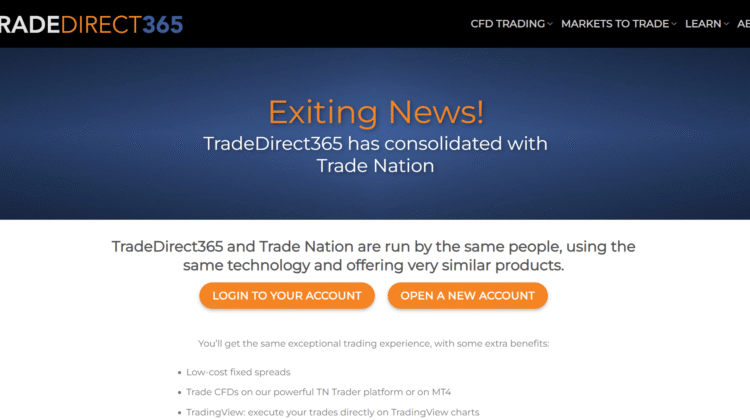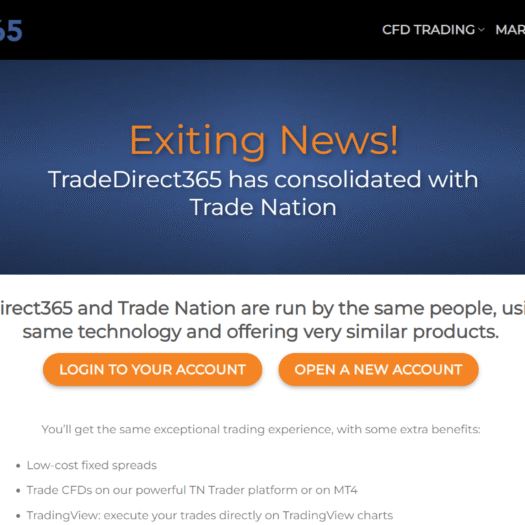
7 Critical Insights: Why TradeDirect365 Looks Solid Yet Has Hidden Limits
7 Critical Insights: Why TradeDirect365 Looks Solid Yet Has Hidden Limits

TradeDirect365 is an Australian CFD and forex broker that many traders praise for its regulatory credentials, fixed spreads, and user-friendly platforms. On the positive side, it appears to offer a lot of what traders want: safety, transparency, and relatively fair costs. On the negative side, there are important trade-offs, reported issues, and limitations you need to understand before trusting them with serious funds. Here are seven critical insights every trader should know about TradeDirect365.
1) Strong regulation under ASIC gives real protection — but be aware of clone warnings
TradeDirect365 operates under Australian regulation, specifically via ASIC (Australian Securities & Investments Commission) under license number 422 661, via the entity Trade Nation Australia Pty Ltd. It holds an Australian Financial Services Licence and must comply with client fund segregation, risk disclosure, and negative balance protection rules. Multiple review sites and broker comparison resources affirm this regulatory standing. However, there are also “suspicious clone” alerts in some broker-watchdog sites, indicating that users should verify the entity they are using is the real regulated one and that the domain is genuine. Regulation by ASIC is a major strength compared to many unregulated or offshore brokers, but fake or misleading usage of the regulated name remains a risk.
2) Fixed spreads and low cost features appeal, though with conditional tradeoffs
TradeDirect365 is noted for offering tight fixed spreads on many CFD and forex instruments via its CloudTrade platform, and competitive floating spreads on MT4. For many traders, fixed spreads offer predictability, which is especially helpful during volatile periods. Costs such as commissions are modest (for example, ASX share-CFDs have low commissions beyond certain value thresholds). Review sites say it delivers among the lowest fixed spread offerings in Australia. However, “lowest cost” depends heavily on the instrument, account type, and platform. Spreads may widen on MT4 during volatility, and commission or fee differences affect profitability, especially for frequent small-trade users. Also, while fixed spreads are good for stability, they sometimes come with slightly wider baseline than ultra-raw floating spreads offered by specialized ECN brokers under ideal conditions.
3) Platforms and instruments are good, but platform-instrument mismatch exists
TradeDirect365 offers multiple platforms: its proprietary web/mobile “CloudTrade” CFD platform, and MetaTrader 4 (MT4). For many users, the CloudTrade platform provides access to a broad range of instruments, ease of use, and fixed spread stability. MT4 is more familiar to experienced forex traders and allows expert advisors or algorithmic trading. But some instruments (e.g. stocks, cryptos) may not be available or fully functional on MT4 vs CloudTrade; certain features like guaranteed stop losses, or faster fills, may differ by platform. Traders expecting identical instrument availability across platforms may be disappointed. Also, some reviews report that CloudTrade’s charting or interface tools are less advanced than competitors or less suited for heavy technical analysis.
4) Minimum deposit is low / demo accounts available — good for beginners, but real-money limits kick in
TradeDirect365 allows very low minimum deposits (some account types start from small amounts) and demo accounts are offered via both platforms. This is helpful for beginners to test, learn, and see live spreads without risk. That is a positive sign and better than brokers that demand high deposits or do not offer realistic demos. But the trade-off: to access certain features (like improved spreads, more instruments, professional/higher leverage status) or withdraw larger sums from profitable trades, you might face stricter verification, minimum trade-volume requirements, or eligibility criteria as a professional (wholesale) client. Also, region or account classification may limit what you can do. So starting small helps, but moving to serious trading may expose costs and restrictions not obvious at signup.
5) Withdrawal, support, and user complaint records are mixed
Many users report positive experiences: deposits and small withdrawals are processed fairly, support is responsive, platforms are functional. But a number of reviews also record frustrations: delays in withdrawal processing, slow verification, differences in trading results between demo and live, platform instability at volatile times, and customer support not always resolving issues clearly. On platforms like ForexPeaceArmy, some users say the web or mobile platforms lag during major news events, or that certain expected features are not functioning or documented clearly. These mixed user feedback points are common with brokers that have legitimate credentials, but they suggest that your real experience may depend heavily on your account size, verification status, and how carefully you test early.
6) Leverage and client classification introduce trade-off risks
TradeDirect365 offers leverage up to 200:1 for certain forex/CFD instruments. This is moderate compared to offshore brokers offering extremely high leverage, yet high enough that improper risk management can lead to large losses. Additionally, professional or wholesale client classification (available under Australian rules) can increase leverage or reduce some restrictions, but it comes with trade-offs: loss of protections that apply to retail clients, such as some disclosure or investor compensation benefits. Many traders may not qualify or prefer to stay retail for protection. Also, leverage restrictions and margin requirements will vary by instrument (stocks, cryptos, indices typically have higher margin requirements), which reduces usable leverage in practice.
7) Reputation is good, but not flawless — marketing vs reality needs scrutiny
TradeDirect365 has been operating since 2014, giving it years of track record, and has become part of the Trade Nation brand. Comparison reviews praise it for low cost fixed spreads, competitive ASX share-CFD terms, and clarity of fee disclosures. But there are criticisms: some users believe that what is advertised (e.g. “lowest spreads,” “platform stability,” “feature availability”) does not always match live trading, particularly during high-volatility periods. Some watchdogs (such as on Wikifx) flag “suspicious clone” status. Others mention that trading tools or research content trail top competitors. Marketing materials often show ideal conditions; real trading conditions (spread, execution speed, slippage, withdrawal speed) may be less favorable. Reputation is a strong asset, but real trust depends on consistency in delivering on promises.
Conclusion: Final Verdict on TradeDirect365
TradeDirect365.com.au is one of the stronger brokers in the Australian and broader CFD/forex landscape, especially when compared to offshore or less regulated firms. Its regulation under ASIC, use of segregated trust accounts (e.g. Westpac bank holding client funds), requirement of negative balance protection, and public legal disclosures are real positives. For traders based in Australia or other jurisdictions where the regulated entity applies, these protections are more meaningful than many brokers offer. The availability of demo accounts, low or modest minimum deposit thresholds, fixed spread options, and stable web/mobile platforms like CloudTrade make it accessible for less experienced traders, while MT4 appeals to those more familiar with technical tools.
However, the attractiveness comes with multiple caveats. First, marketing often shows ideal conditions — such as minimal spreads, quick execution, full instrument availability — but real-live conditions, especially under volatility or news events, may differ. Differences between platforms (CloudTrade vs MT4) in instrument availability and feature sets mean you may not get everything you expect unless you read carefully for your account type.
Second, user feedback reveals friction points. Even well-regulated brokers can struggle with delays in withdrawal or verification, platform performance during high market stress, and support responsiveness when many clients are active. These issues often show up more clearly after profit is real, not in demo or small deposit phase. That suggests that careful testing is essential: place small trades, make small profit, request a withdrawal early to see how smooth the process is in your region, for your payment method.
Third, leverage and classification rules mean that while up-to-200:1 leverage sounds good, real usable leverage may be much lower depending on your location, instrument, and whether you stay a retail client. Also, moving to wholesale or professional status to get higher leverage means giving up some protections, something many traders overlook until too late.
Finally, though TradeDirect365’s regulation is a major advantage, clone warnings from some watchdogs (e.g. on Wikifx) are concerning. Sometimes brokers or mirror sites misuse names, regulatory license numbers, or brand identity in misleading ways. Always ensure you are using the genuine domain, check ASIC’s license database directly, verify address and support contact details, and read the fine print.
So is TradeDirect365 a safe broker? On balance, yes — especially compared to many unregulated or offshore brokers. It offers regulatory protection, decent cost structure, competitive fixed spreads, and platform flexibility. If you are a trader who values these aspects, it may well serve your needs. But it is not perfect. If you expect ultra-tight spreads in volatile markets, zero friction in withdrawals, or identical conditions across all platforms and instruments, you may be disappointed.
If I were you, I would do this: open a small real account after using a demo. Make some trades under live conditions. Make a small profit. Request a withdrawal. Use conservative leverage throughout to limit downside. Keep detailed records of everything. And always compare actual cost (spread + commission + financing + possible currency conversion) rather than just advertised rates. If that all works, then scale up.
In conclusion: TradeDirect365 is among the more reliable, well-regulated brokers for many traders, especially those in Australia or using its regulated entity. But like all brokers, it has limitations, costs, and risks. Use it with respect for those risks, not with blind trust.









